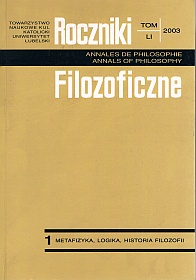The Idea of the Good as Arche in Plato's Politea
(transl. by Edward I. Zieliński & Marek Osmański)
Abstract
The article discusses Socrates' views on what the Good is that are presented by Plato in his Politea. It takes into consideration two interpretations: Socrates' statements contained in Politea on the one hand, and interpretation of the Good that functions in the so-called indirect tradition, that is in doxographic texts by Aristotle, Theophrast and other authors (Testimonia Platonica). According to Socrates the Good is the most fundamental principle of all that exists (arche), but Socrates did not define further what it is. According to the `indirect tradition' the Good is also a positive principle, and its essence is One. Besides the Good as One the `indirect tradition' also assumed existence of an unspecified duality. Mutual determining of these principles leads to the origin of reality. The author of the article tries to find an answer to the question: which of these interpretations of the Good is more accurate.
Copyright (c) 2003 Roczniki Filozoficzne

This work is licensed under a Creative Commons Attribution-NonCommercial-NoDerivatives 4.0 International License.





